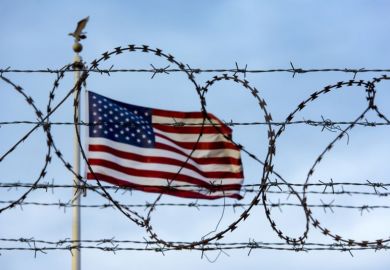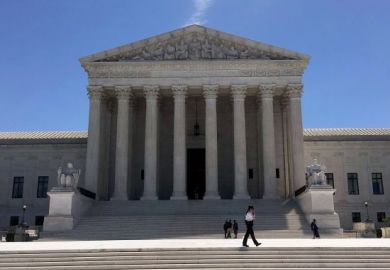The Trump administration has put a hard wall in front of international students, saying that they must attend in-person classes this autumn if their university offers them, and that they cannot remain in the US if their college moves entirely online.
The position, announced by the US Immigration and Customs Enforcement agency, ends an emergency exemption that had allowed foreign college students to remain in the country as their institutions moved online this spring.
The decision threatens significant economic damage for many US universities, given their heavy dependence on full-fee-paying international students, the growing number of institutions likely to remain with online-heavy or online-only formats in the autumn, and the relative willingness of foreign students to remain enrolled either way.
“On its face,” the American Council on Education said in a statement, “the guidance released today by Immigration and Customs Enforcement is horrifying.”
US universities and their students need maximum flexibility to handle a fast-changing situation, said the council, the leading US higher education association. “Iron-clad federal rules are not the answer at this time of great uncertainty,” ACE said.
The damage is likely to be especially bad for public colleges, where data have shown international students to account for almost 30 per cent of total fee revenue despite comprising about 12 per cent of total enrolment.
“Schools need to be nimble as they adjust to such great unknowns,” the Association of Public and Land-grant Universities said in a statement. “Yet the only thing certain under the administration’s new rules is that international students will needlessly be placed in limbo in the midst of a pandemic and possibly forced to go home mid-semester.”
The Trump administration announced its decision without explaining its rationale or holding open discussions with the higher education community, although it has a history of taking positions widely regarded as inhospitable towards immigrants.
Many US colleges have spent the summer season concerned that their domestic students might skip the autumn semester rather than pay for an online experience, while encouraged that some 90 per cent of foreign students remained in the US while planning to resume classes.
But under the administration’s new policy, international students at colleges that operate entirely online this autumn must leave the US or find a new college with in-person classes.
At US colleges offering “normal in-person classes”, or a hybrid mix of in-person and online, the administration policy keeps foreign students bound by usual federal rules that allow them to take no more than one class or three credit hours online.
The administration said in its announcement that it allowed international students to remain in the US this spring and summer, after US colleges closed their physical campuses, as a temporary exemption during the pandemic.
In a brief written response to questions, an ICE spokeswoman said the new policy “still provides significant exemptions” compared with the usual regulations for international students.
A majority of US colleges have been telling their students during the summer that they are planning for in-person classes. But many of those commitments have been tentative, allowing for the possibility of online formats.
Now, with coronavirus infection rates climbing across much of the country, colleges increasingly have been conceding that their students should expect a heavy or exclusive reliance on virtual formats this autumn.
The latest include Harvard and Princeton universities, which announced that most of their autumn classes will be online and most of their students will remain away from campus.
“This pandemic is among the worst crises ever to hit Princeton or college education more broadly,” Princeton’s president, Christopher Eisgruber, wrote to the campus community.
US colleges and universities host more than 1 million international students, and federal data show that they contribute some $45 billion (£36 billion) to the US economy.
Register to continue
Why register?
- Registration is free and only takes a moment
- Once registered, you can read 3 articles a month
- Sign up for our newsletter
Subscribe
Or subscribe for unlimited access to:
- Unlimited access to news, views, insights & reviews
- Digital editions
- Digital access to THE’s university and college rankings analysis
Already registered or a current subscriber?








